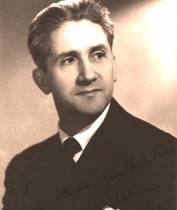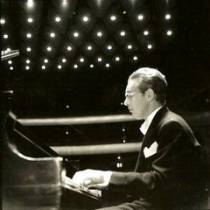
Roger Désormière (13 September 1898 – 25 October 1963) Désormière was born in Vichy in 1898. He studied at the Paris Conservatoire, where his professors included Philippe Gaubert (flute), Xavier Leroux and Charles Koechlin (composition), and Vincent d'Indy (conducting). In 1922 he won the Prix Blumenthal and in 1923 became part of the Ecole d’Arcueil. Désormière’s early conducting experience was largely with the Ballets suédois and Sergei Diaghilev's Ballets Russes. He was conductor of the Ballets suédois's premiere of Relâche (1924), a film and music presentation by Francis Picabia and Erik Satie, with the film segment, Entr'acte, directed by René Clair. He then worked for the Diaghilev company from 1925 until the impresario's death, conducting the premieres of Barabau by Vittorio Rieti, The Prodigal Son and Le pas d'acier by Sergei Prokofiev, and La Chatte by Henri Sauguet. Beginning in 1932 he became closely involved in music for films with Pathé-Nathan, composing music for La Règle du jeu, Le Mariage de Chiffon, and Le Voyageur de la Toussaint. He also conducted the orchestra in over 20 other films, such as Partie de campagne, Remorques, La Belle et la bête, and La Beauté du diable. He conducted the first complete recording of Claude Debussy's opera Pelléas et Mélisande, the sessions taking place in the salle de l’ancien Conservatoire, Paris, from 24 April to 26 May 1941, during the Nazi occupation, with the 20-record set being issued in January 1942. He also recorded excerpts from Chabrier’s L'étoile with Opéra-Comique forces during the war. During the occupation of Paris he was a member of the Front National des Musiciens; after Milhaud was forced to leave France, Désormière saved his paintings and personal possessions as well as paying the apartment rent during the Occupation. He also won considerable fame as an enthusiastic champion of 20th-century repertoire; Satie, Olivier Messiaen, Pierre Boulez, Henri Dutilleux, and Maurice Duruflé all benefited from his advocacy of their pieces. At the other chronological extreme, Désormière edited and performed early music, reviving mostly forgotten compositions by the likes of François Couperin, Jean-Philippe Rameau, and Michel Richard Delalande. From 1937 he was a leading conductor for the Paris Opéra-Comique, conducting, in addition to the creations below and recordings above, Une éducation manquée, L'heure espagnole, Le médecin malgré lui, Don Quichotte and L’Enlèvement au Sérail. He became an associate director of the Paris Opéra from 1945 to 1946. While driving in Rome during 1952, he suffered a massive paralytic stroke that ended all his musical activities. Aphasic for the rest of his life, he remained a recluse. He died in Paris in 1963. 
Géza Anda (19 November 1921 – 14 June 1976)
Anda was born in 1921 in Budapest. He studied with some of the renowned teachers of the 20th century such as Imre Stefaniai and Imre Keeri-Szanto, and became a pupil of Ernst von Dohnányi and Zoltán Kodály at the Franz Liszt Academy in Budapest. In 1940 he won the Liszt Prize, and in the next year, he made an international name for himself with his performance of Brahms's Piano Concerto No. 2. In 1941, he also made his debut with the Berlin Philharmonic under Wilhelm Furtwängler, who dubbed him "troubadour of the piano." In 1943, he settled in Switzerland. He was married to Hortense Bührle, daughter of Emil Georg Bührle (owner Schweiz. Werkzeugmaschinenfabrik and art collector), Zürich. In the mid-1950s, Anda gave masterclasses at the Salzburg Mozarteum, and in 1960 he took the position of director of the Lucerne masterclasses, succeeding Edwin Fischer. His students included Per Enflo, who later became renowned for his work in mathematical analysis. As a performer, Anda was particularly noted for his interpretation of Schumann's piano music. The New Grove Dictionary cites his "charismatic readings of Bartók and Schumann". He was regarded as the principal Bartók interpreter of his generation, even if other pianists since his death have made more obviously exciting recordings of that composer's concertos. Although he played very little Mozart in his early career, he became the first pianist to record the full cycle of Mozart's piano concerti; he recorded them between 1961 and 1969, conducting himself from the keyboard. His performance of the Andante from Mozart's Piano Concerto No. 21 in C on the soundtrack of the 1967 film Elvira Madigan led to the epithet "Elvira Madigan" often being applied to the concerto. "From the outset of his career, he was what one might call a philosopher-virtuoso. In his lifelong quest for the perfect balance of head and heart, between intellect and instinct, he explored many facets of music-making." He was honored in 1965 by being named a Chevalier of the Ordre des Arts et des Lettres, and he also become an honorary member of the Royal Academy of Music in 1970. He died on 14 June 1976 in Zurich, Switzerland. His cause of death was esophageal cancer.
********************************
Johannes Brahms
Piano Concerto No. 2 in B-flat major, Op. 83 Géza Anda, piano
Orchestre National de France Roger Désormière
12.06.1949
********************************
Запись из личной коллекции
| 
